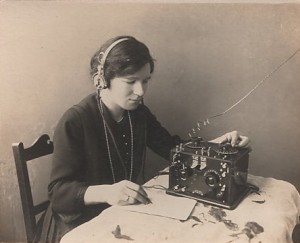|
e: robins@robinsizemore.com |
|
I recently took the classes in Anacortes, passed the class and soon afterward, received my license in the mail. I was now an amateur radio operator, technician class. Whoo Hoo! Now, to put into practice all that I have learned.
Now, this looks like me, long ago, not, but trying to find someone to listen too. Currently, I have two Yeasu portable radios. One 2 meters and the other both 2 m and 70 cm. Not much to listen to. Except for posted nets, it was mostly quiet. It got me thinking. I worked in commercial radio broadcasting most of my adult life and most of the engineers were amateurs. I heard stories of fox and hound games, disaster drills, chat sessions, etc. Now, I was listening and felt under whelmed. Where are the people? I read blogs on the Internet and talked to people where I discovered that VHF and UHF are going to the way side, according to opinion. People were shifting to HF. Since, I don’t own one, I can’t comment. It would be nice to know. The popular theory is with the advent of mobile phones, VoIP and e-mail/Facebook has killed the need for two way radio. There is an easier way to communicate now, with less trouble. A writer, Todd Daugherty N9OGL, wrote awhile back, "Amateur radio is dying because it is unable to keep up with commercial services." One of the reasons I wanted to get my ticket is for emergency communications. I like to back county camping and there is no mobile service where I go. I cannot afford a satellite phone and I loved the idea of a phone link on a repeater. With more mobile phones, the repeaters are losing that capability. Hello, sat phone now. So, amateur is reinventing/upgrading itself to DSTAR and the like. Digital radio will open so much more. This is cool. But it relies on the Internet backbone, I am told. Well, the science fiction reader in me has read/seen all of the tales. In a major, insert incident here; cloud storage/computing gone, mobile phones gone, Internet gone, etc. Where will amateur digital be? A few months ago, I was driving across Mount Vernon, listening to the repeater when I heard a teenage girl radio her mom to say she was on her way home. My first thought was why she was not using her phone? Also, I finally heard a real conversation. I felt like I was eavesdropping. This was the last real conversation I have heard. So, ham is not for conversations, and the only other traffic I hear on a regular basis in net check ins. This means amateur radio service is still ready and waiting for emergency communications. So, it is still relevant. But to me and others it seems the relevance is in emergency service. A backup. Part of the relevance issue to me is the attitude of the FCC and the NTIA. Both agencies seem to play musical chairs with frequency allocations. How do they see amateur service. Back in 2005, Congress put forth in a bill the stripping of the 70 cm band and reallocating it to first responder broadband as a way of dealing with lack of communication abilities from recent disasters, like Katrina. It comes down to amateur radio being relevant, but in a different way. Emergency communications and most important, as a hobby as it was intended. With a computer, sound card and interfaces you can do just about anything you want with your radio. Relevance to you might be different to what it is to me, how is it for you. It is so easy to chat with someone in the outback downunder while playing them chess. Try doing the same thing with a HF rig. It can be done, it expands the hobby and real connections.
|
 The woman in the picture here is, Florence Violet McKenzie who back in the 1890’s became Australia’s first female electrical engineer, first female amateur radio operator, and founder of the Electrical Association for Women.
The woman in the picture here is, Florence Violet McKenzie who back in the 1890’s became Australia’s first female electrical engineer, first female amateur radio operator, and founder of the Electrical Association for Women.